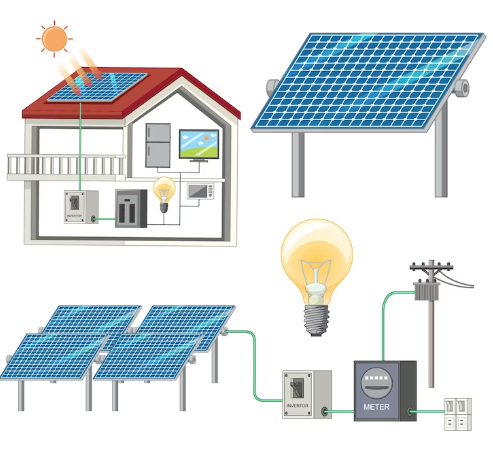Top 10 Common Myths About Solar System in India
Solar energy, a powerful and renewable source of power, has been rapidly gaining traction in India as an eco-friendly solution to the country’s energy challenges.Despite its growing popularity, there are still several myths and misconceptions surrounding solar energy. In this blog, we’ll dive deep into the top 10 common myths about solar energy in India and shed light on the facts that dispel these misconceptions.
Myth 1: Solar Panels Don't Work on Cloudy Days
Fact: While it’s true that solar panels are most efficient in direct sunlight, they can still generate electricity on cloudy days. Solar panels are designed to capture not only direct sunlight but also diffuse sunlight. This means that even when the sky is overcast, solar panels can produce a significant amount of energy, making them a viable energy solution in regions with varying weather patterns like India.
Myth 2: Solar Energy is Expensive
Fact: This myth might have held some truth in the past, but the cost of solar energy has significantly decreased in recent years. The initial investment in solar panel installation can be offset by various government incentives, tax benefits, and subsidies available in India.
Over time, the savings on electricity bills make solar energy a financially viable and sound investment.
Myth 3: Solar Energy is Inconsistent
Fact: Modern advancements in solar technology, including energy storage solutions, have addressed the issue of consistency. Energy storage systems, like batteries, can store excess energy generated during sunny periods for use during the night or on cloudy days.
This ensures a steady supply of electricity, making solar energy a reliable source of power.
Myth 4: Solar Panels Require Excessive Maintenance
Fact: Solar panels are designed to be low-maintenance and durable. They have no moving parts, which minimizes the risk of breakdowns.
Routine maintenance mainly involves occasional cleaning to remove dirt and debris. With proper care, solar panels can operate efficiently for decades, requiring minimal maintenance.
Myth 5: Solar Energy is Only for Affluent Individuals
Fact: Solar energy is becoming increasingly accessible to people of all income levels. Various financing options, such as solar leasing and power purchase agreements (PPAs), allow individuals and businesses to adopt solar energy without a significant upfront investment.
These arrangements often have lower energy costs compared to traditional utilities.
Myth 6: Solar Panel Installation Damages Roofs
Fact: When installed by professionals, solar panels can enhance the protection of your roof by providing an additional layer against the elements.
Proper installation techniques ensure that the roof’s integrity is maintained, and the panels are securely mounted.
Myth 7: Solar Energy is Inefficient in India
Fact: India’s geographical location ensures ample sunlight throughout the year, making it an ideal region for solar energy production.
In fact, India has set ambitious renewable energy targets and has made significant strides in solar energy adoption, becoming a global leader in the field.
Myth 8: Solar Energy is Not Environmentally Friendly
Fact: Solar energy is a clean and sustainable energy source that produces no greenhouse gas emissions during its operation.
By harnessing solar power, India can significantly reduce its carbon footprint and contribute to a cleaner environment.
Myth 9: Solar Panels Must Face South Only
Fact: While south-facing panels do receive the most direct sunlight, solar panels installed on east or west-facing roofs can still generate substantial energy.
Advances in solar technology allow panels to capture sunlight from various angles, making it feasible to install panels on roofs with different orientations.
Myth 10: Solar Energy is Impractical for Industries
Fact: On the contrary, solar energy is becoming increasingly practical for industries in India.
Many large-scale industrial establishments are adopting solar power to cut operational costs and align with sustainability goals. With advancements in technology, solar installations can cater to the energy demands of various industries.
Conclusion:
As India makes significant strides towards a greener and more sustainable future, dispelling these common myths about solar energy is crucial. The reality is that solar energy is an efficient, cost-effective, and eco-friendly energy solution that holds immense potential for the country. By understanding the facts behind these myths, individuals and industries can make informed decisions that contribute to the widespread adoption of solar energy in India. As technology continues to evolve and awareness grows, solar power will undoubtedly play a central role in shaping India’s energy landscape for years to come.

Ileen Kaur (Author)
Ileen Kaur is an exceptional content writer, bringing her expertise and creativity to the digital realm. With a passion for storytelling and a knack for crafting compelling narratives, she has the power to captivate audiences and leave a lasting impression.


